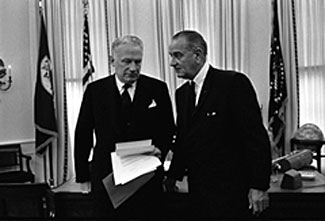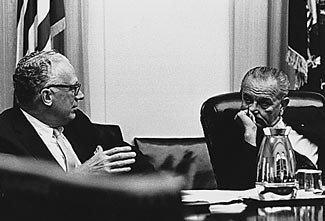|
Document
2. Views of George Ball, Undersecretary of State
Memo
Date: October
5, 1964
(for details,
see: George Ball, "Top Secret: The Prophecy the President
Rejected," Atlantic Monthly, July 1972;and David
Halbestam, The Best and the Brightest, pp. 491-499.)
Also consult the memo written by William P. Bundy.
(Who
was George Ball?)
 |
 |
Undersecretary
of State George Ball and President Lyndon B. Johnson, Lyndon
Baines Johnson Library and Museum |
Advisors:
Undersecretary of State George Ball and President Lyndon
B. Johnson, 07/14/1966,
National Archives and Records Administration |
"...
our primary motive is unquestionably political. It is to make
clear to the whole Free World that we will assist any nation that
asks for our help in defending itself against Communist aggression."
For this to occur, at a minimum the U.S. must demonstrate the
superiority of its military power. "To do otherwise would
enormously diminish American prestige around the world and cause
others to lose faith in the tenacity of our purpose and the integrity
of our promises."
But
the U.S. position in Vietnam may not allow the achievement of
these aims. The political situation in Saigon may continue to
crumble. The movement of North Vietnamese troops could make the
use of U.S. troops unavoidable. As long as the North Vietnamese
believe victory is near, they "would probably be willing
to accept very substantial costs from United States air action."
The introduction of U.S. ground troops would put the U.S. in the
same position as the French, open the door to significant criticism
at home, and invite a counter escalation by the North Vietnamese.
The entry of Chinese troops would raise the specter of the use
of nuclear weapons. Because of the willingness of the North Vietnamese
to resist, the scale and intensity of U.S. attacks involve considerable
risks of escalation.
"...
it remains to be proved that in terms of U.S. prestige and our
world position, we would risk less or gain more through enlarging
the war than through searching for an immediate political solution
that would avoid deeper U.S. involvement."
Ball
describes the reaction to his memo:
"When
I completed the memorandum, I sent it to Secretary McNamara, Mac
Bundy, and Secretary Rusk. Bob McNamara in particular seemed shocked
that anyone would challenge the verities in such an abrupt and
unvarnished manner and implied that I had been imprudent in putting
such doubts on paper.... My colleagues were dead set against the
views I presented and uninterested in the point-by-point discussion
I had hoped to provoke. They regarded me with benign tolerance;
to them my memorandum seemed merely an idiosyncratic diversion
from the only relevant problem: how to win the war." McGeorge
Bundy said: "I never found his picture of the alternative
very persuasive, or, indeed, persuasive at all."
(Source:
William C. Gibbons, The U.S. Government and the Vietnam War:
Part II: 1961-1964, Princeton 1986, 360-362)
|
